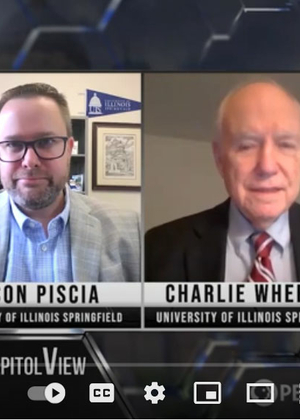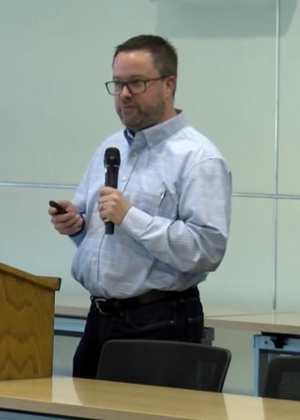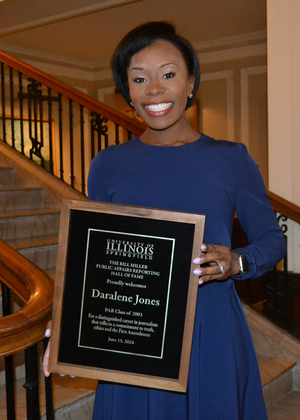PAR trains students to become journalists who produce intelligent news coverage about government and politics.
Here's what sets PAR apart from other graduate-level journalism programs:
- TIME-EFFICIENT: Earn a master's degree in just 10 months
- AFFORDABLE: Save money with guaranteed scholarships, tuition waivers and stipends
- REAL EXPERIENCE: Cover Illinois politics for a professional newspaper, wire service, TV station or radio station as part of a PAID internship.
From our Alumni ...
"If you want to be a hotshot covering politics and government, come learn what it takes to work on the Greatest Beat on Planet Earth. The Public Affairs Reporting program plugs you into the same electrifying Illinois Statehouse environment that propelled Barack Obama to Washington and sent a string of governors to prison. The experience will catapult you ahead of your peers."
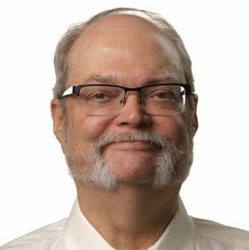
"For any aspiring reporter who wants on-the-ground training, I cannot point to a better program than PAR. It did more to prepare me for the real world in one year than four years of undergrad. The classes are designed to be specifically relevant to public affairs and what you’re later covering. The real experience working in the Capitol is invaluable."

"The PAR program at UIS is, hands down, the best training ground for journalists who are serious about learning how government works and why it impacts everything we do. I've worked in four states and the knowledge I gained during my time at UIS has always helped me hit the ground running."

"I found PAR at a critical point early in my career, when I was in the journalism industry but not doing what I love most: reporting. This program helped me achieve my goals and taught me to think critically and hustle in a fast-paced environment. I feel blessed to be passionate about what I do, and I wouldn’t be where I am today without PAR."
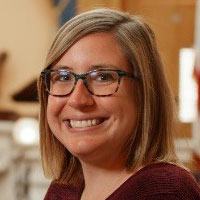
Learn more: PAR Alumni

Support PAR
Your gifts to the Public Affairs Reporting program help us provide vital scholarship funds to current students, recruit the next generation of journalists and more. Thank you for your continued support.
PAR FAQs
More questions? PAR director (and 1998 PAR graduate) Jason Piscia can be reached at jason.piscia@uis.edu or (217) 206-7494. He’s also available to lead prospective students on tours of the UIS campus and the Illinois Statehouse.
What is PAR?
PAR is an affordable, 10-month master’s degree program that trains students to become journalists who produce intelligent news coverage about government and politics. A new class begins every August. The program’s centerpiece is a six-month paid internship covering the Illinois General Assembly’s spring session for a professional news organization.
How do I get into PAR?
- Bachelor’s degree
- Good academic record
- Solid writing skills
- Desire to report on government, politics and other public affairs topics
- Apply (see below)
Is previous journalism experience required?
It’s helpful but not required. Many PAR students are early career reporters and/or journalism majors who worked at a campus news outlet. But we also accept students who complete undergraduate degrees in other disciplines, including political science, creative writing and sociology and want to apply those skills to a career in journalism.
Do I need to take the Graduate Record Exam?
No.
What are the financial benefits of PAR?
PAR is the most time- and cost-efficient way to level up your journalism experience while also earning a master’s degree that will enhance your job prospects throughout your career. We offer these financial benefits for all PAR students:
- Tuition waivers during the spring and summer semesters
- Guaranteed scholarships
- A paid internship funded by the university, internship hosts and a generous grant from the Joyce Foundation.
What is the application process like?
First, fill out an online application. We’ll need writing samples, reference letters and college transcripts. Each applicant must complete a timed news writing test. If you demonstrate a strong desire to be a serious journalist and an ability to succeed in graduate school, you have a strong chance of being accepted to the program.
How many students do you accept in each class?
About 12.
What does a typical PAR year look like?
We begin in August. Each student takes four courses during the fall semester: Advanced Public Affairs Reporting (PAR 501), Developing Public Policy in Illinois (PAR 510) and two graduate-level electives. Many students choose electives from Communication, Political Science or Legal Studies.
In January, students begin their Statehouse news internships (PAR 504). They also take one required course (Legislative Issues – PAR 503) and one more elective during the spring semester. The internship continues into the summer semester (PAR 505).
Students can depart PAR as early as June 1 if they’ve secured a job. The program officially ends June 30.
How do the internships work?
PAR partners with professional media organizations to provide state government news reporting positions for students. Internship hosts include newspapers, wire services, television stations and radio outlets. In November, students and internship hosts meet for a series of job interviews. The PAR director then matches each student to an outlet. Students work as journalists under the supervision and mentorship of the outlet’s bureau chief, editors or news director. Students’ work will be read, seen and heard by audiences throughout Illinois.
Do I have to write a thesis?
No. Instead of a thesis, PAR’s capstone requirement for a master's degree is a portfolio featuring a student’s best work from their internship, demonstrating a mastery in public affairs journalism.
What is the job placement rate for a PAR graduate?
We average close to 100 percent for each graduating class. The results aren’t surprising, considering what graduates bring to the table. The reporting internships provide students with published or aired work products to show what they did in the demanding environment of the Statehouse.
Students leave PAR prepared to step into the most demanding beats a newsroom has to offer, and hiring managers know it. That’s why editors and news directors call us looking for alums who might be available to fill openings. In fact, the callers are often PAR grads themselves.
